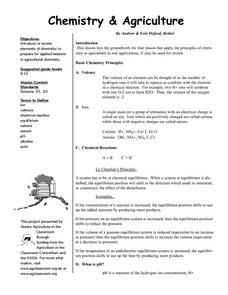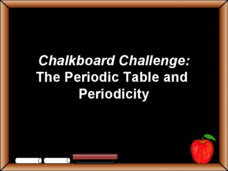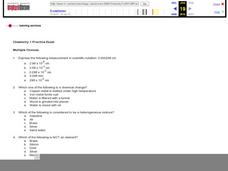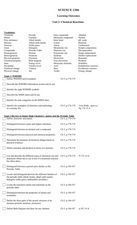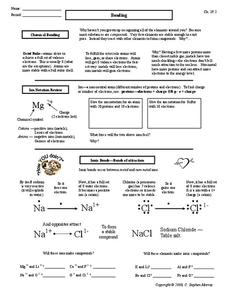Curated OER
7.012 F’04 Problem Set 1 ~ Biology
Course identification information is included in the upper left corner as well as within the title of this worksheet. If you overlook or remove that information, you are left with a tremendous college biology assignment. There are only...
Curated OER
Basic Chemistry Principles
Students use the basic principles of Chemistry to determine pH levels. Elements of the Periodic Table are also included in this instructional activity.
Curated OER
Chalkboard Challenge: The Periodic Table and Periodicity
In a well-prepared Jeopardy-style game, your chemisty class can review the periodic table. Questions cover the element groups, some history, atomic number, atomic and ionic radii, electronegativity, and the shielding effect. What a fun...
Virginia Department of Education
Chemical Bonds
How are chemical bonds similar and how are they different? Provide your young chemists with the resources to more thoroughly understand the concepts of ionic and covalent bonds. Pupils research these topics, diagram examples of each...
Science Geek
Periodic Trends
If your pupils think Um is the element of confusion, this presentation on period trends can only help. It covers the patterns for atomic radii, ionization energy, and electronegativity across a period and down a group.
Curated OER
Chemistry 1 Practice Exam
Thirty multiple-choice questions and their answers are provided in this resource. It was written for a general chemistry course and queries test takers on scientific notation, mixtures, chemical symbols, electric charges, Dalton's atomic...
Curated OER
Chapter 12 Worksheet - Ions, Ionic Bonding, anc Covalent Bonding
Four pages provide plenty of problem solving practice for chemistry whizzes. They answer questions and write electron configurations for ions. They use Lewis dot diagrams to display equations. Covalent bonds are explored. The last half...
Curated OER
The Nature of Salt
High schoolers record information from the periodic table for sodium and chloride. They determine whether salts are molecular or ionic compounds, along with sodium chloride's molecular weight, and relative weights
Curated OER
Review Set
The topics covered in these multiple choice questions are about atomic structure and bonding, state configurations, pressure and solution concentration, and energy graphs. This is a midterm review which could be used with the whole...
Curated OER
Learning Outcomes
In this science worksheet, students explore the learning outcomes for a unit on chemical reactions. Students define 60 vocabulary words and answer a list of questions for each topic.
Curated OER
Periodic Table
In this periodic table and elements learning exercise, students review valence electrons, octet rule, oxidation number, and the difference between metals and non-metals on the periodic table. This learning exercise has 5 matching, 20...
Curated OER
Charge and Electricity
In this electricity worksheet, high schoolers read about electric charge, ionic notation, and conductors and insulators. Then students complete 19 matching, 6 fill in the blank, and 2 short answer questions.
Curated OER
Types of Chemical Reactions
In this chemical reactions worksheet, students are given directions about three types of reactions and how to write balanced equations for each. They then are given ten practice problems to complete using the information given.
Curated OER
Types of Chemical Reactions
In this chemical reactions activity, students read about the 3 types of chemical equations and how to write balanced ionic equations. Students are given 5 equations to balance, write the type of reaction, write the total ionic equation,...
Curated OER
Bonding
In this bonding instructional activity, students read about the two different types of chemical bonding: ionic and covalent bonds. Students review ion notation and oxidation numbers. This instructional activity has 24 fill in the blank,...
Curated OER
Naming and Covalent Compounds
In this compounds worksheet, learners practice naming compounds and classifying them as ionic, covalent, or polyatomic compounds. This worksheet has 12 fill in the blank and 12 problems to solve.
Curated OER
Naming and Covalent Compounds
In this naming and covalent compounds activity, students name 12 compounds using a chart of polyatomic ions if needed. They also draw covalent bonds in 6 compounds and answer 6 questions about ionic bonds, covalent bonds and polyatomic...
Curated OER
Chemical Bonding and Shapes of Molecules
In this chemical bonds worksheet, students review the different types of bonds, Lewis dot structures, ions, and molecule shapes. This worksheet has 10 matching, 17 multiple choice, and 3 drawing questions.
Curated OER
More Chemical Bonding
In this chemical bonding worksheet, students review the three types of compounds: ionic, covalent, and polyatomic. Students practice drawing the covalent bonds of given compounds. This worksheet has 5 drawings and 13 fill in the blank...
Curated OER
More Chemical Bonding
For this chemical bonding worksheet, high schoolers review the three types of bonds including ionic, covalent and polyatomic compounds. They identify 8 compounds as ionic, covalent or polyatomic and they make 4 ionic compounds and they...
Curated OER
A Guided Tour of the Periodic Table
In this periodic table worksheet, learners write the chemical symbols for the given elements, compare atomic number and mass number, and describe the importance of valence electrons in the organization of the periodic table. This...
Curated OER
Chemistry Unit on Compounds, Formulas, and Equations
Students perform a review assignment in 3 portions to review chemistry compounds, formulas, and equations. The assignment consists of several different portions that can be used as assessments. The majority of the lesson plan is composed...
Curated OER
Elements
For this elements worksheet, learners determine the atomic number, mass, number, electrons, protons, and neutrons for elements. Students review the electromagnetic spectrum. This worksheet has 1 graphic organizer and 13 multiple choice...
Curated OER
The Structure of Matter
In this matter activity, students compare and contrast chemical and physical properties and explain the relationship between a pure substance and a mixture. Students review the properties of metals and nonmetals. This activity has 1...

